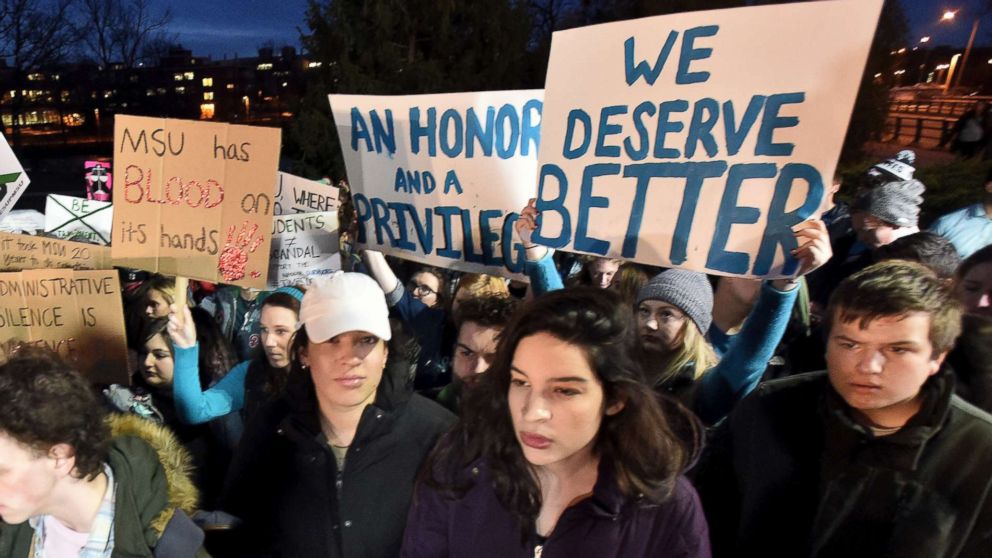
A federal investigation slammed Michigan State University’s handling of sexual assault reports stemming for the Larry Nassar scandal and for violating campus safety laws in general to the point that it “posed an ongoing threat” to students and staff.
The findings are part of a U.S. Department of Education investigation triggered by the serial sexual assaults on university athletes by Nassar, the East Lansing school’s former sports medicine physician and Olympic gymnastics team doctor.
“Michigan State failed to compile and disclose accurate and complete crime statistics because its crime statistics did not include the sex crimes that Nassar committed during the years in which the statistics were reported,” reads the 46-page preliminary report, obtained Thursday by ABC News.
Nassar was sentenced in January 2018 to serve 40 to 175 years in prison after pleading guilty to sexually assaulting numerous athletes at Michigan State and in his capacity as the doctor for the U.S. Olympics gymnastics team and USA Gymnastics.
The report found “serious violations” by university officials of the Clery Act, which requires U.S. universities that participate in federal student aid programs to issue timely notifications of crimes that occur on campuses.
In addition to its mishandling of the Nassar case, the university, failed to report numerous on-campus burglaries, robberies and attempted robberies dating back to 2013, according to the federal investigation.
“Failure to issue Timely Warnings to notify the community of serious and on-going threats deprives students and employees of vital, time-sensitive information, and effectively denies the campus community the opportunity to take adequate steps to provide for their own safety and to increase their situational awareness,” the report states.
“Instead of warning the community as required by the Clery Act, Michigan State allowed robberies of expensive electronic devices and brazen burglaries of occupied dorm rooms … to continue unabated,” according to the report.
In one glaring example, the report detailed three burglaries at an on-campus dormitory that occurred on Nov. 13, 2014, as students were asleep in their rooms. All the break-ins were investigated by MSU police.
“By November 20, seven days later, another 13 burglaries had occurred,” the report reads. “Overall, 25 Michigan State students were victimized over this eight-day period. MSUPD finally issued what it deemed to be a Timely Warning on the ninth day.”
University officials did not dispute the findings in the preliminary report and said they will immediately follow actions required by the U.S. Department of Education, including enhancing its training of campus security officers in the Clery Act.
“Michigan State is advised that such remedial measures cannot and do not diminish the seriousness of these violations, nor do they eliminate the possibility that the Department [of Education] will impose an adverse administrative action and/or require additional corrective measures as a result,” the report states.
University officials said they are preparing a written response to the federal report.
“The safety and well-being of our campus community is our top priority,” MSU acting president Satish Udpa, said in a statement. “The Nassar crimes caused so much pain to so many people, and we have more work with experts to review and strengthen areas as we renew our commitment to improve.”
The fallout from the Nassar case prompted the resignation of MSU president Lou Anna Simon amid accusations that employees at Michigan State covered up Nassar’s crimes.
In August, the school’s former gymnastics coach Kathie Klages was charged with allegedly lying about her knowledge of Nassar’s crimes. Nassar’s ex-boss William Strampel, the former dean of the MSU medical school, was arrested and charged with misconduct of a public official, criminal sexual conduct and neglect of duty for how he handled complaints against Nassar.





